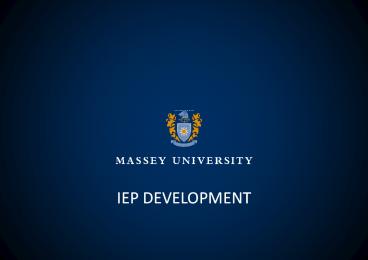IEP DEVELOPMENT - PowerPoint PPT Presentation
1 / 17
Title:
IEP DEVELOPMENT
Description:
Te KeteIpurangi (TkI) states: The ideal outcome for AE students is a successful return to mainstream education, either at a school or tertiary education. – PowerPoint PPT presentation
Number of Views:113
Avg rating:3.0/5.0
Title: IEP DEVELOPMENT
1
IEP DEVELOPMENT
2
- Whakatauki
- Ma te whiritahi, ka whakatutuki ai nga pumanawa a
tangata - Together weaving the realisation of potential .
3
- Today your facilitators are
4
Outcomes for today
- To
- Gain an overview of the IEP purpose and content
- Develop an IEP including parent/whanau/caregiver
and student voice - Demonstrate how to identify, set, monitor and
evaluate IEP goals - Discuss how to use IEPs to plan an AE programme
and why this is important - Explore other approaches and solutions for
managing, developing and using IEPs.
5
- Survey monkey what did it reveal?
6
- Why have an IEP?
- A beacon
- - an aspiration of excellent outcomes
- A compass
- -a learning and teaching guide
- A check
- ensuring student
- needs are being met
7
- Part of your charter and policy focus
- Te Kete Ipurangi (TkI) states
- The ideal outcome for AE students is a
successful return to mainstream education, either
at a school or tertiary education. Engagement in
AE programme itself may be an excellent outcome
that may assist in changing the students
perception of themselves as learners.
8
- 2010 ERO Report Good practice in Alternative
Education - Good practice suggests that a focus on the whole
student, through a common tool, (the IEP)
clarifies and ensures a common understanding of
the goals for the student. - Supports the links between the curriculum and the
goals for the student.
9
- Contractual and Reporting Requirements .
- Development and review of IEPs
- Literacy development goals
- Numeracy development goals
- Key competencies/graduate profile goals
- Curriculum based goals
- Credits /units achieved
- Transition planning
10
- How do IEPs help students?
- By ensuring students have a voice in the process
of transition. - Ensuring the goals of Alternative Education for
the students and staff are focussed on student
learning and pathways. - These learning goals and
- pathways being regularly
- reviewed and progress
- monitored. (ERO 2010)
11
GROW
- Goals
- Reality
- Options
- What will you do
12
- NZ Curriculum Essential Learning Areas
- English and Te Reo Maori
- Mathematics
- Science
- Technology
- PE and Health
- The Arts
- Languages
- Social Sciences
13
- NZ Curriculum Key competencies
- Thinking
- Using language, symbols and text
- Managing self
- Relating to others
- Participating and contributing
14
Evidence for setting and monitoring goals
- Demographic evidence
- Achievement evidence
- Perception evidence
15
Demographic evidence
- Students - ethnicity, gender, age, year level,
attendance, lateness, disciplinary data, previous
school, - Parents/caregivers and community location,
occupations
16
Achievement evidence
- National assessment results Achievement and
unit standards, NCEA - Standardised assessment results administered
internally - PAT, STAR, asTTle, PROBE, - Other in-school assessments - most
non-standardised tests - Student work - work completion rates, exercise
books, notes, performance - these can provide
useful supplementary evidence
17
Perception evidence
- Evidence about what students, staff, parents and
the community think about the school - Self appraisal student perceptions of their own
abilities, potential, achievements, attitudes - Formal and informal observations made by teachers
- peer interactions, behaviour, attitudes,
engagement, student-teacher relationships,
learning styles, classroom dynamics - Structured interactions - records from student
interviews, parent interviews, SWOT analysis,
staff conferences on students - Externally generated reports -, NZCER surveys
- Student voice - student surveys, focus group
interviews































